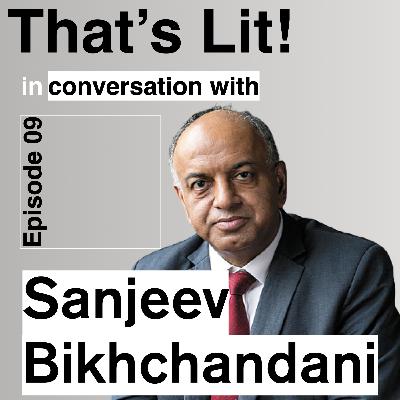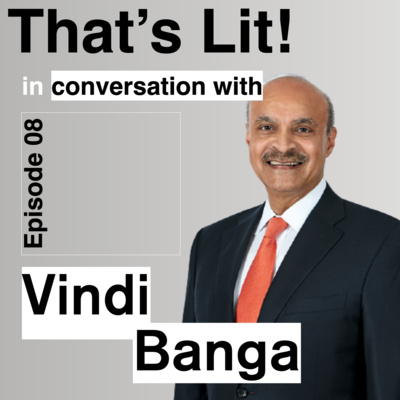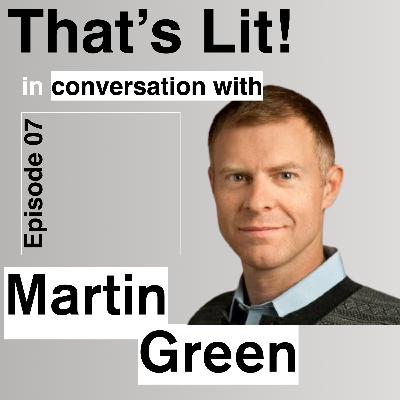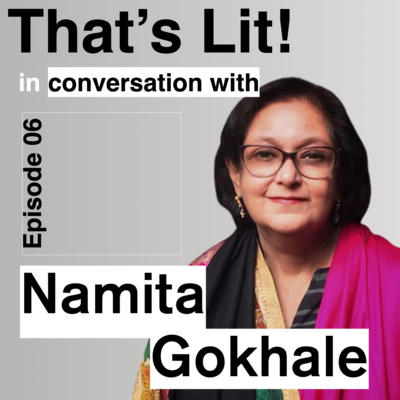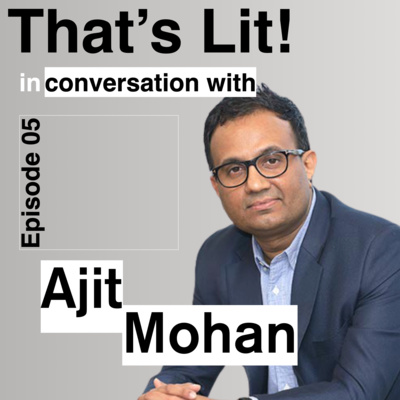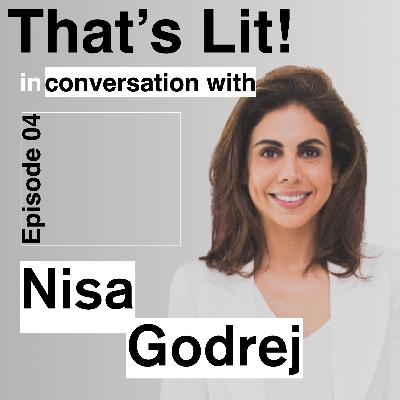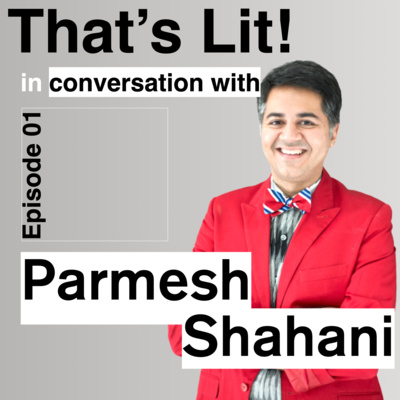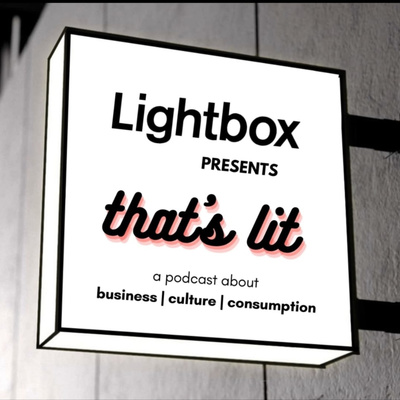Discover That's Lit!
That's Lit!

That's Lit!
Author: Lightbox
Subscribed: 0Played: 4Subscribe
Share
© Lightbox
Description
We’re Lightbox. A venture capital firm based in Mumbai run by 4 partners, Sandeep Murthy, Sid Talwar, Prashant Mehta and Jeremy Wenokur. Every year, we sit down and discuss all the things we want to become more familiar with. Learn more about. All the questions we want answered. What we love about the word questions, is that within the word there is a quest, and so every year, we go on a quest to learn even more. This year, we want you to join us and that’s what this podcast is all about. That’s Lit! The Lightbox Podcast where we’re talking about all things culture, consumption and technology.
11 Episodes
Reverse
On our final episode, we speak with Sanjeev Bikchandani – a messiah of India’s Internet start-ups. The founder and Vice chairman of InfoEdge and also the co-founder of Ashoka University. He was recently awarded the Padma Shri in Jan 2020. He got into the IITs and IIMs - the crem de la crem - but he pursued advertising. A free thinker who started Naukri.com as a small idea within a string of ideas. Tune in to hear about his spectacular journey, views on venture capital and education.
Quotables:
“We’re prisoners of our visiting cards, EMI’s and I didn’t want to fall into that trap of chasing success of false proxies”
“ I said no to so many pre-series A like Ola and FlipKart without meeting them, Taxi, BigBasket, LensKart and the only reason was that I could not figure out how they make money. But in all the companies we invested in - we knew how they could make money”
“Truly great entrepreneurs don't listen. They have a conversation, but they will do what is right. Not so great entrepreneurs also won't listen, but they will end up doing the wrong thing”
“ If you invest behind a team that needs more than 2% hand holding, you’re after the wrong company ”
“Your reputation is your biggest asset”
Episode notes and transcriptions available on: https://lightbox.vc/new-thinking/
Today, Hindustan Unilever is the most well-known FMCG name in India – with over 8 million stores selling its products, the company had a turnover of 45,000 CR+ in FY21. However, this wasn’t the case when Vindi Banga joined the company. A career spanning an immense 33 years, Vindi climbed the HUL ladder as swiftly as anyone has, ending up as chairman of the company and the president of the global foods, home and personal care division of Unilever. In this episode with Vindi Banga, we deep dive into what went on at HUL during the three decades that he was there, how the company thought of the Indian consumer, and how founders in India today should think about building their own brands and businesses.
Quotables:
"Reigniting growth for our core consumer businesses and our brands meant really trying to understand where the innovation should go. That is all about listening to the customer and the consumer. We started a drive in the company to get everybody connected with the customer and the consumer."
"Communication with shareholders is extremely important, and that's a piece of advice for your founders. It's really important to engage with your shareholders."
"It doesn't matter if you keep collecting apples, oranges and pears if you don't have the best apples in town."
Episode notes and transcriptions available on: https://lightbox.vc/new-thinking/
On this episode, we're speaking with an expert in investment management, Martin Green, who runs Cambrian asset management. Martin has 25 years experience in the tech sector. He began his career at Morgan Stanley, where he was a senior executive at CNET Networks, which was later acquired by CBS and Meebo, which was acquired by Google. Today, we're going to talk to Martin about the world of crypto, DeFi and NFTs, Web 3.0, the creator economy, and pretty much everything that seems to be puzzling us in this new age and changing everything that's going on.
Quotables:
1) "Now, in the case of bitcoin, what it's doing is, it's essentially a decentralized escrow service. It's giving certainty of the ability to settle a transaction. That's in my view what bitcoin does exceptionally well, and does it uniquely."
2) "So, I'm not in favor of using coal to power bitcoin, but I am in favor of monstrous amounts of energy being utilized for very high value things. And I'm in favor of people being able to make those decisions without a central planning authority saying we like this energy usage, we don't like that energy usage. And I'm also in favor of energy production, I should say that is, as sustainable as possible. So, I realize those things are a little bit in conflict. But I just wanted to say that to start now, bitcoin does, I should say, utilize a fair amount of energy. The amount that is used is in direct relationship to its certainty of settlement, its security. And so, if you want permissionless, decentralized security, it has to come from somewhere."
3) "So imagine if you go back to the origins of the internet and you say, would it be valuable to have the ability to transfer bits across a distributed computer network and without having to clear them through a central intermediary? And then someone proposed TCP IP, and that became a standard. Now imagine if instead of TCP IP being just an open protocol where there is no finite number of TCP IP addresses. Imagine if there was, but they were divisible. That's essentially what you have with bitcoin. And so, what you're doing is essentially owning a piece of the TCP IP infrastructure, but for value bits now."
Episode notes and transcriptions available on: https://lightbox.vc/new-thinking/
On this episode, we're talking about content, shift in culture, and the evolution of the Jaipur Literature Festival. It started as a seed of a small idea in 2002, wanting to make the Indian literary voices heard. Over the years, Sanjay Roy, William Dalrymple, and Namita have a perfect understanding of the vision for the literature festival that makes it the uniquely creative space that it is now. Namita gives us an inside view of Indian literature, how the image of women changed over time and how she's built an international brand that's not the most loved across the world.
Quotables:
"Anger is a constructive emotion because the focus on something that you think is wrong leads to action."
"In Indian literature, the more you seek diversity, the more you get unity. The more you seek unity, the more you get diversity because there is always something in common, it's just the interpretation that is different."
"Indian women are among the strongest in the world individually. They have to cope with family, careers, and responsibility inculcated in their sanskars. The larger the burden, the stronger the head that carries it."
Book links:
Turmeric Nation: https://amazon.in/dp/B08FTC7ZLW/ref=dp-kindle-redirect?_encoding=UTF8&btkr=1
In Search of Sita: https://amazon.in/dp/B06XYML5K1/ref=dp-kindle-redirect?_encoding=UTF8&btkr=1
Finding Radha: https://amazon.in/dp/B07KSDBDJS/ref=dp-kindle-redirect?_encoding=UTF8&btkr=1
Episode notes and transcriptions available on: https://lightbox.vc/new-thinking/
With 300MM+ Monthly Active Users, and 28MM+ paid subscribers accounting for over 30% of Disney's entire customer base, Hotstar is arguably the most popular OTT platform in India, and that too by a margin. In this episode with Ajit Mohan, we dive deep into Hotstar's meteoric rise, starting right from ideation to building it into what it is today, and learn from Ajit's experiences of building a massively successful company, ground up.
Quotables:
"A few months into running starsports.com we had 100,000 paying subscribers, and I remember James saying, "Why don't we just open this up for free?" It was clear that if we had to change the space, we had to do something fundamentally different."
"We believe in building one great product, rather than multiple products, which means attracting great engineering talent from India."
"Very often, you can be influenced by your historical legacy success (which is probably credible), but sometimes you just have to break away from that legacy to build something even better for the emerging world."
"One of the great markers for leaders is - how agile and open are you? People who are militantly open tend to be the ones that chart new frontiers. Can this founder find a way to make decisions? How open and agile are they? I also believe in diversity and to look for people that are not like you. Finally, aggression of ambition and the impact they make on the world."
Episode notes and transcriptions available on:
https://lightbox.vc/newthinking/subcategory/season-1
Nisa is the chairperson of Godrej Consumer Products Ltd., a business with diversified products across health, beauty, and home products. She's quietly built one of the most loved consumer brands across categories and successfully managed to make Godrej a brand that consumers across the globe know, love and trust. This episode is all about branding, sustainability, geographical expansion, and product development.
Quotables:
"Change is not coming, it's here, and it's important to embrace this change while also focusing on your core - your brand. Keep it relevant."
Link to book recommendation:
Different - Escaping The Competitive Herd by Youngme Moon: https://www.amazon.in/dp/B0036S4CNE/ref=dp-kindle-redirect?_encoding=UTF8&btkr=1
Episode notes and transcriptions available on:
https://lightbox.vc/new-thinking/
Fondly called AK and very fond of building products, we chat with Ambarish Kenghe about product, product, and product! AK talks about building Chromecast from scratch and shares his product management philosophy. We cover the 'less is more' philosophy that Google Pay uses and growth measures for success when building a product. Finally, we also talk about the qualities to look for when hiring product managers.
Ambarish has been with Google for over a decade, and with a slight left turn to Myntra for a couple of years in between also heading product there, he's been with Google for a while. At Google, he was PM at Google TV, where he co-founded Chromecast and most recently has been responsible for Google Pay – the most ubiquitous payment platform in India today.
Quotables on his 3 step philosophy on successfully launching a product.
"The most important aspect is Ownership. Then
Get your priorities right. Ask yourself honestly - do you have your minimum viable product and not too much more?
Make sure your basics work. The important stuff.
Find a way to reach your consumers - what does marketing look like?"
Link to book recommendation
Why We Sleep by Matthew Walker: https://www.amazon.in/Why-We-Sleep-Unlocking-Dreams/dp/1501144316/
Episode notes and transcriptions available on:
https://lightbox.vc/new-thinking/
We’re in conversation with power woman Ireena Vittal as she talks about brands, quality and the importance of distribution done right. Given the wealth of experience, she shares thoughts on the role of supermarkets in the future, dark stores and choosing your board members.
Ireena is an independent advisor currently on the board of companies in India and abroad, large and emerging unicorns. A partner with McKinsey & Co. for 16 years, where she advised global companies on growth and sustainable scaling. Earlier, worked with Nestle and MaxTouch (now Vodafone). She has also co-authored several studies on productive agriculture, sustainable rural growth and inclusive urbanization, and has helped government and public institutions design and implement solutions instrumental to India’s development in these areas.
Quotables: "The total addressable market will continue to grow, but a sensible player doesn't grow too far ahead of the market otherwise you're bleeding money and an even more sensible player always refreshes the brand so that they always remain good on the palate and aspirational as a brand. People don't buy brands, they buy pieces of identity."
Episode notes and transcriptions available on:
https://lightbox.vc/new-thinking/episode-02-board-room-conversations-with-ireena-vittal
In this candid conversation Parmesh takes us through his journey starting the Godrej Culture Lab. We speak about the increased quest for authenticity, importance of diversity and inclusion not just being lip service, but more ingrained within company culture and also shift in content creation which affects consumption and habits across the country. We also cover benefits that come with incorporating diversity and inclusion at the workplace in terms of financial outcomes and innovation.
Parmesh Shahani is the author of 2 books – Gay Bombay and Queeristan. He’s worked across businesses, creative industries and academia in different capacities and founded the Godrej Culture Lab. He’s been an evangelist on inclusion in the world and has managed to bring to the forefront topics that have been in the shadows for a long time. A passionate advocate and champion for LGBTQ inclusion in workplaces, he believes in co-creating an India in which everyone feels equal and included.
Quotables: “Don’t worry about what other people say. There’s no way to live your life in terms of who you want to love and how you want to live.”
Link to books:
https://www.parmesh.net/my-books/
Episode notes and transcriptions available on:
https://lightbox.vc/new-thinking/episode-01-parmesh-shahani-writer-creator-and-inclusion-advocate
Hi. Welcome to the pilot episode of That’s Lit! – Our podcast on culture, consumption and technology. As venture capitalists, we are forever apprentices, we love learning new things and we learn from everyone – academics, students, entrepreneurs, lawyers, pandits, startup executives, journalists, accountants and of course other VCs. They teach us about customer experience, business models, management, design, complex corporate structures, legal matters and a whole host of things. Tune in and get to know the personalities behind these episodes, their journey over the years, why we started this podcast and what to expect from the upcoming episodes.
That’s Lit! – The Lightbox Podcast where we’re talking about all things culture, consumption and technology.


